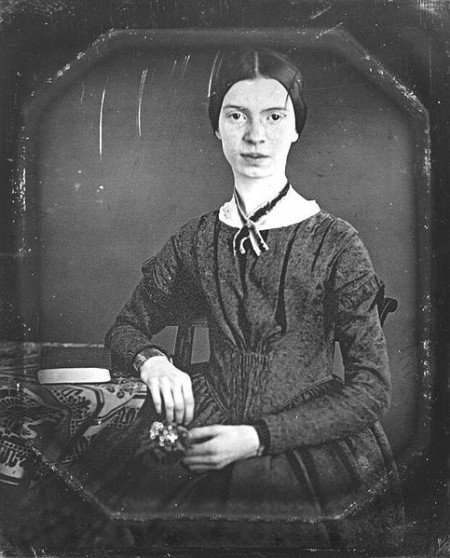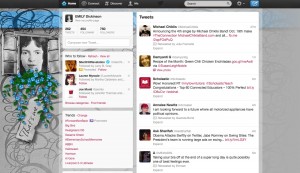Social Media? No! People Person? Yes!
The Soul Selects Her Own Society
by Emily DickinsonThe soul selects her own society,
Then shuts the door;
On her divine majority
Obtrude no more.Unmoved, she notes the chariot’s pausing
At her low gate;
Unmoved, an emperor is kneeling
Upon her mat.I’ve known her from an ample nation
Choose one;
Then close the valves of her attention
Like stone.
 The biggest argument I hear against social media is that it is a time drain.
The biggest argument I hear against social media is that it is a time drain.
In 1986, Richard B. Sewall talked about his biography of Emily Dickinson. He said she wrote “warm, loving, marvelous letters.” At the time, there were three published volumes of letters, but they represented “only about a tenth of what we know she wrote. She was a people person. Never mind that poem about selecting her own society and shutting the valves of her attention like a stone; her life revolved around people.” (Extraordinary Lives: The Art and Craft of American Biography, edited by William Zinsser. New York: American Heritage, 1986. P. 77)
Other writers of the 18th and 19th century talk about spending an hour or two a day writing letters to keep those connections with people vibrant.
It’s likely that Emily Dickinson would have loved Tweets! Especially because she was an expert in short verse! 140 characters? No problem for ED!
Connecting with People Takes Time
In other words, people connections have always taken large amounts of time for writers. Why do we think it’s any different today? We write in our caves, but in order for our writing to speak to today’s society, we must connect with others: think through ideas and discuss contemporary issues; hook up with those who can put our work in front of others; be bolstered by other writers, even as we encourage; live in the midst of a literary community that is firmly nestled within the very fibers of our nation.
If the recluse poet’s life revolved around people, why do we balk so at social media? It enables a connected life, a life that revolves around people. The medium of letters has changed to blogs, tweets, Facebook posts, but the reason we do these things hasn’t changed. Perhaps the medium also affects how shallow or deep those connections are, but that’s a different issue. Social media is social: people.
The question then becomes this: Do you want to connect with people? Are you a people person?
Are Your Tweets “Warm, loving, marvelous?”
However, social media today is easily misused. If you only think of it as a way of self-promotion, this warping of the purposes of the communication tools we use is self-destructive. It can be a self-absorbed life, which is all about “Me.” I dare you to call most tweets “warm, loving, marvelous.”
Question: I am looking for quotes from other 17th-mid20th century authors/writers/poets in which they discuss the time they spent writing letters. Any ideas?

So true! Which makes me wonder if the poets on twitter know something some of us don’t. Short verse works very well in that format. (Hugs)Indigo
Love this post! I’ve always thought of my FB page as my own syndicated column. Social media has been the way out of my trapped life! I learned to be a writer again. And NOW I’ve discovered Twitter! @sandeetweets
I loved this post, Darcy. I have thought about it often over the past few days. I have been guilty of complaining about the “burden” of social media before, but I have recently embraced the joys of the interactions. Social media keeps us in touch with people who read (and write), and the more connected we are to other people, the more powerful, the more meaningful, our writing will be. Thanks, as always, for your insightful posts.
This is brilliant — really gives me a new way to think about this and and i’m excited to talk about it with my writing partner. I’ve been edging toward this whole social media reluctantly — your post gives me a way to begin opening toward it with a sense that i might actually come to value it, to even welcome and enjoy it. thanks, darcy.
Susi–
Glad you liked this idea. It does give a different spin to social media!
Darcy
Excellent article Darcy! I have been slowly overcoming by reluctance to use social media professionally. Your article sealed it for me!
The tools we use today may not be the same tools we used thirty years ago, Darcy, but your post really illustrates how they serve the same purpose…that of connection to others. Whether it’s to our readers, other writers, family members, or re-connection with friends of long ago, what we get out of a tool depends on what we put into it.
I enjoyed reading your thoughts, and thank you for taking the time to share them with us! I think Emily would be pleased! :-)
Thanks, Gayle!
Gloria, I hope you enjoy the social media!
DArcy
One issue you are neglecting to comment on is that ED left a prolific body of work – handwritten – without the intentions of ever publishing it while she was alive. It was her sister who found the correspondence and thousands of poems that ED authored. ED I don’t think would have had anything to do with social media. It is impersonal for one thing, and also, who prints out blogs?! Emails?! Facebook conversations?! We are discussing a poet, anonymous during her lifetime, who has been dead for over one hundred years due to the physical papers she left behind. I am failing to think of any one individual artist that has made a lasting impact through their work on the web via social media.
Marie:
Yes, I know that Emily didn’t publish during her lifetime. But I’m talking about a writing life, living a full life connected to your society in many ways, while still being able to write.
Katherine Paterson commented once that it seemed like her family took up so much of her time; yet it was those very people that gave her something to write about.
As writers, we struggle to our communities and engage fully with the people we love, while still making time to write. I’m just saying it is not a new struggle, but an old one reinvented in this age of social media.
Darcy